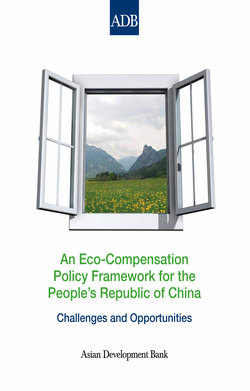An Eco-Compensation Policy Framework for the People's Republic of China

Реклама. ООО «ЛитРес», ИНН: 7719571260.
Оглавление
Qingfeng Zhang. An Eco-Compensation Policy Framework for the People's Republic of China
Contents
Foreword
Acknowledgments
Abbreviations
Introduction: Ambition and Momentum for Eco-Compensation Policy
PES attracts respectable government financing levels
PES policy gains momentum
Local government innovation influences central policies
The Policy Debate: What is Meant by “Eco-Compensation”?
Defining Payment for Ecosystem Services
Defining Eco-Compensation
Usage in this Report
Current Status of Eco-Compensation in the People’s Republic of China
The Reality Check: Challenges in Designing Payments for Ecosystem Services
Uncertainty and Risks
Market Failures
Institutional Coordination
International Experience and the Role of Government in Ecosystem Service Markets
Role 1—Buyer
Role 2—Regulator
Role 3—Enabler
International Experience in Choosing More Cost-Effective Payment Mechanism
Direct Payment—General Subsidy
Direct Payment—Negotiation
Direct Payment—Scored Subsidy
Direct Payment—Reverse Auction
Mitigation and Offset Payments
Certification
Towards a More Effective Eco-Compensation Policy Framework
Legal and Regulatory Grounds for Eco-compensation
Keys to Making Eco-Compensation More Effective
Leveraging Existing Sector Policies and Measures
Conclusion
References
Отрывок из книги
An Eco-Compensation Policy Framework for the People’s Republic of China
Challenges and Opportunities
.....
•conducted a total estimated transaction value of $7.8 billion on a variety of payment schemes for watershed services, which has escalated from eight in 1999 to more than 47 in 2008 and covering about 290 million ha.3
In 2005, the fifth Plenary Session of the 16th Central Committee of the Chinese Communist Party issued, for the first time, the principles for developing eco-compensation mechanisms. As a result, the State Council released Document No. 39, State Council Decision Regarding Using the Scientific Development View to Strengthen Environmental Protection, which states that the government “…should improve eco-compensation policy, and develop eco-compensation mechanisms as quickly as possible” (State Council 2005).4 The PRC’s Ministry of Environmental Protection (MEP) has also issued its own Guiding Opinions on the Development of Eco-compensation Pilot Work, which targets four pilot areas: western PRC; key ecological function reserves (e.g., nature reserves and restricted construction zones); natural resource use (e.g., forests, grasslands, wetlands, and mineral resources); and watershed services. MEP also set out five fundamental principles for developing eco-compensation policies and mechanisms (MEP 2007a):
.....